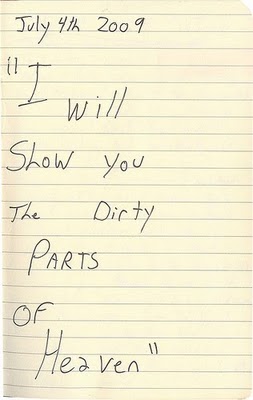‘I’m not trying to make art, I’m trying to make lies, because the truth hurts.’ –Dm Simons
The Gulf Oil Spill Disaster
First, let’s begin with the “good” news. The ecological destruction that was first feared is not going to be as bad as once thought, for a variety of reasons. It is not good, but it is not the unmitigated disaster it could have been.
Edward Overton, PhD, Professor Emeritus, Dept. of Environmental Sciences, LSU, is an expert on oil spills. He was at the Exxon Valdez. The Exxon Valdez (EV) was a big, black, thick tide of oil. The Deepwater Horizon is a much bigger spill: every ten days the amount of the EV spill spewed into the Gulf, from April 20 to July 15. Professor Overton spoke mostly for the record. He is very much a concerned environmentalist, and he is also a very serious scientist.
He reminded us that the Louisiana wetlands are a very important part of the ecological system of the Gulf of Mexico. Oversimplifying, they are the nutrient source for the small animal world which feeds the larger. Without the wetlands much of the Gulf ecosystem dies. If they were destroyed, they would not come back very easily, as without their very root system the land would erode away. Bluntly, oil kills wetlands if it gets into it.
There are only three ways to get rid of an oil spill. You can mechanically remove it, chemically remove it, or burn it. They used all three methods. But not fast enough. The Obama administration dithered while Rome burned. (This is not from Overton.) (…)
What should have been a no-brainer decision to use the Dutch ships was delayed for whatever reason. What should have been a no-brainer decision to waive the water purity rules was delayed beyond reason. My personal opinion. Whoever participated in that decision should be allowed to return to the private sector. They only made the problem of the spill worse. They should not be allowed near the decision-making process again.
Please note, this is no defense of British Petroleum. As noted below, they were extremely negligent, and deserve the costs and more. We just don’t need to compound stupid, incompetent, irresponsible (choose several more adjectives, some with color) corporate acts with dumb government ones.
There is a chemical called Corexit that is a product line of solvents primarily used as dispersants for breaking up oil slicks. It is produced by Nalco Holding Company. Corexit was the most-used dispersant in the Deepwater Horizon oil spill in the Gulf of Mexico, with COREXIT 9527 having been replaced by COREXIT 9500 after the former was deemed too toxic. Oil that would normally rise to the surface of the water is broken up by the dispersant into small globules that can then remain suspended in the water.
In hindsight, Overton thinks the use of Corexit was the correct thing to do. It probably saved the wetlands. But it is not without its own bad effects.
When you put Corexit on an oil slick, the surface oil disperses but also drops into the ocean about 15 feet. While Corexit (basically a type of soap) itself is not toxic (an admittedly controversial claim), the resulting dispersed oil is quite toxic. Fish swimming through it can be and are harmed. Marine mammals like porpoises are seriously harmed when they rise to breathe through an oil slick.
But here is the good news. It turns out that there are about the equivalent of two Exxon Valdezes a year from natural oil seepage from the floor of the oceans. The Gulf has an ecosystem of bacteria that eat that oil, which are then eaten again by plankton. To those bacteria, dispersed oil is filet mignon. They thrive and grow rapidly, turning that toxic waste into nutrients, which are absorbed by the plankton. The bacteria keep on growing until they lose their source of nutrition (the toxic oil) and then die out over time. Note: once absorbed by the bacteria, the oil is no longer toxic. There are no toxic minerals like mercury introduced into the ecosystem.
update:



